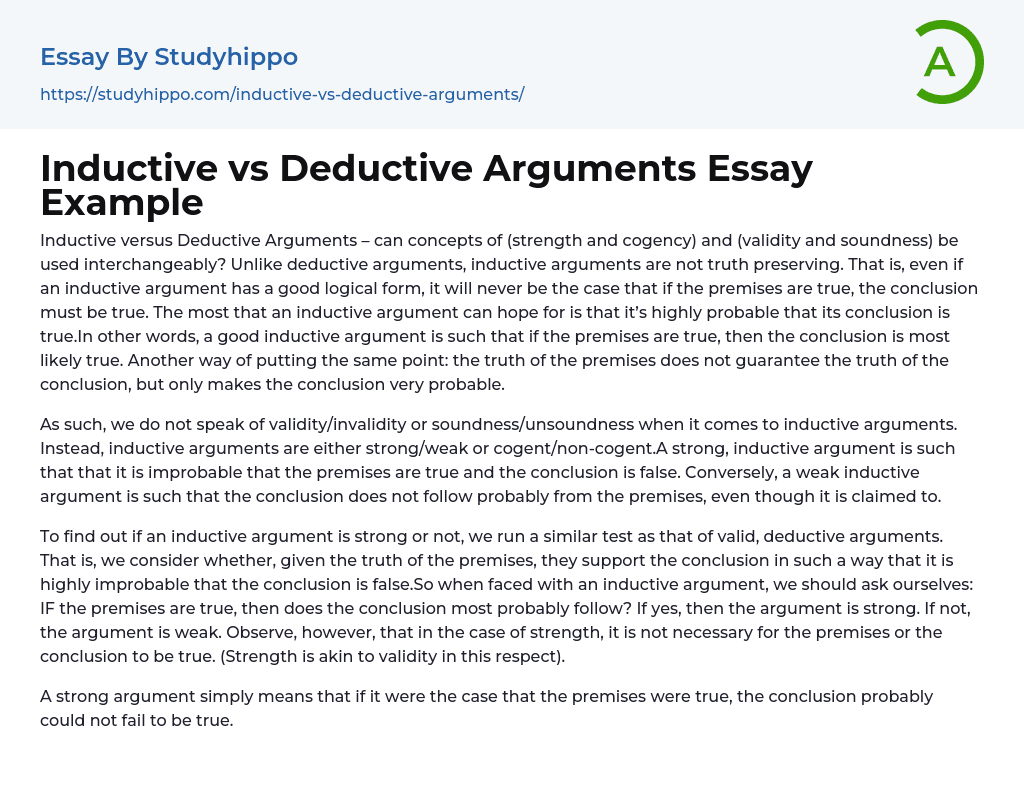Inductive versus Deductive Arguments – can concepts of (strength and cogency) and (validity and soundness) be used interchangeably? Unlike deductive arguments, inductive arguments are not truth preserving. That is, even if an inductive argument has a good logical form, it will never be the case that if the premises are true, the conclusion must be true. The most that an inductive argument can hope for is that it’s highly probable that its conclusion is true.In other words, a good inductive argument is such that if the premises are true, then the conclusion is most likely true. Another way of putting the same point: the truth of the premises does not guarantee the truth of the conclusion, but only makes the conclusion very probable.
As such, we do not speak of validity/invalidity or soundness/unsoundness when it comes
...to inductive arguments. Instead, inductive arguments are either strong/weak or cogent/non-cogent.A strong, inductive argument is such that that it is improbable that the premises are true and the conclusion is false. Conversely, a weak inductive argument is such that the conclusion does not follow probably from the premises, even though it is claimed to.
To find out if an inductive argument is strong or not, we run a similar test as that of valid, deductive arguments. That is, we consider whether, given the truth of the premises, they support the conclusion in such a way that it is highly improbable that the conclusion is false.So when faced with an inductive argument, we should ask ourselves: IF the premises are true, then does the conclusion most probably follow? If yes, then the argument is strong. If not, the argument is
weak. Observe, however, that in the case of strength, it is not necessary for the premises or the conclusion to be true. (Strength is akin to validity in this respect).
A strong argument simply means that if it were the case that the premises were true, the conclusion probably could not fail to be true.
- Correlation essays
- Price Elasticity Of Demand essays
- Algebra essays
- Arithmetic essays
- Statistics essays
- Measurement essays
- Geometry essays
- Regression Analysis essays
- Derivative essays
- Integral essays
- Mean essays
- Normal Distribution essays
- Probability Theory essays
- Variance essays
- Cycle essays
- Shape essays
- John Locke essays
- 9/11 essays
- A Good Teacher essays
- A Healthy Diet essays
- A Modest Proposal essays
- A&P essays
- Academic Achievement essays
- Achievement essays
- Achieving goals essays
- Admission essays
- Advantages And Disadvantages Of Internet essays
- Alcoholic drinks essays
- Ammonia essays
- Analytical essays
- Ancient Olympic Games essays
- APA essays
- Arabian Peninsula essays
- Argument essays
- Argumentative essays
- Art essays
- Atlantic Ocean essays
- Auto-ethnography essays
- Autobiography essays
- Ballad essays
- Batman essays
- Binge Eating essays
- Black Power Movement essays
- Blogger essays
- Body Mass Index essays
- Book I Want a Wife essays
- Boycott essays
- Breastfeeding essays
- Bulimia Nervosa essays
- Business essays




